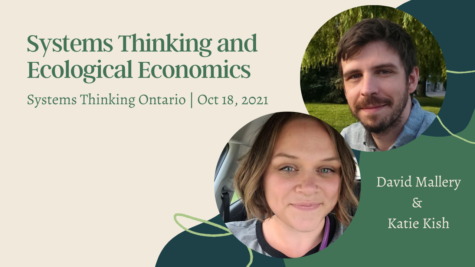In the 1980s, ecological economics seemed to be mostly economists extending their work towards environmental and resource concerns. In the 2020s, ecological economics is seeing a new generation first schooled in other disciplines such as environmental studies or one of the social sciences, then coming into economics. Programs that encourage the new perspective include the Economics for the Anthropocene partnership, and Leadership for the Ecozoic network. Emerging scholars can bring a new research agenda.
This is what I’ve been learning through the Canadian Society for Ecological Economics (CANSEE). To bring some of that perspective to the Systems Thinking Ontario community, I invited Katie Kish and David Mallery for a conversation.
This video has been archived on the Internet Archive .
| Video | H.264 MP4 |
| October 18 (1h41m) |
[ (FHD 1547kbps 1.19GB) [on the Internet Archive] |
Audio downloadable onto mobile devices was transcoded from the video into MP3.
| Audio | |
| October 18 (1h41m) |
[20211018_ST-ON EcologicalEconomics_Kish_Mallery.mp3] (35.5MB) |
Here is the content from the original announcement.
For this session, Katie Kish and David Mallery will lead a discussion on Ecological Economics in two parts.
(1) Where is Ecological Economics going with Systems Thinking?
- In the “Critical Pluralism” paper (see below), the newest generation of EE scholars is portrayed as taking a regenerative approach to research and learning. This is best navigated with critical pluralistic approaches well-developed in systems thinking. The shift might be better supported through a wider set of systems tools, which might also have complementary effects on systems methodologies.
(2) What could a 30-year research agenda for Ecological Economics be?
- The “Paying Attention” paper (see below), is one in a special section of “Ecological Economics: The next 30 years”.
Katie has been working for the Global Footprint Network, that uses big data to produce the Ecological Footprint Accounts. Applying this data on individual and group behaviour change raises questions on the role and ethics associated with big data.
The special section of the journal aims to find synergies between existing work and how to evaluate matters that have urgency and importance. Katie welcomes discussion on any of these papers, and is providing access to a private cache (to those without access to a university library).
Biographies
- Katie Kish is the Senior Development Officer for the Footprint Data Foundation through the York Footprint Initiative and lecturer of Ecological Economics at the Haida Gwaii Institute, UBC. Her career has largely focused on capacity building for the international ecological economics community and training emerging scholars on the effective use of systems methodologies.
- David Mallery is currently an instructor in the Ecological Economics course at York University. He is a doctoral candidate in the Faculty of Environment and Urban Change, examining the epistemological predicaments associated with mainstream quantitative methodologies informing environmental and economic policy.
Suggested pre-readings
Topic 1:
- Kish, Katie, David Mallery, Gabriel Yahya Haage, R. Melgar-Melgar, M. Burke, C. Orr, N. L. Smolyar, S. Sanniti, and J. Larson. 2021. “Fostering Critical Pluralism with Systems Theory, Methods, and Heuristics.” Ecological Economics 189 (November): 107171. https://doi.org/10.1016/j.ecolecon.2021.107171. (cached on academia.edu )
Topic 2:
- Kish, Kaitlin. 2020. “Paying Attention: Big Data and Social Advertising as Barriers to Ecological Change.” Sustainability 12 (24): 10589. https://doi.org/10.3390/su122410589. (cached on academia.edu )
- Farley, Joshua, and Kaitlin Kish. 2021. “Ecological Economics: The next 30 Years.” Ecological Economics 190 (December): 107211. https://doi.org/10.1016/j.ecolecon.2021.107211. (cached on academia.edu).



